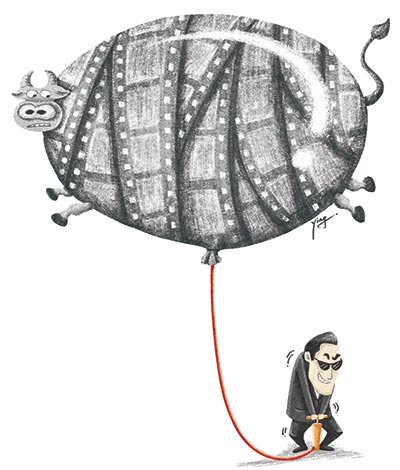China's film business is booming. By the end of the National Day holiday week in October, the year's total box office was 35 billion yuan ($5.56 billion), higher than the cumulative takings of 2014, which stood at 29.6 billion.
But just as every cloud has a silver lining, every heartening story may have its dark spot. Some of the box-office figures, according to recent press investigations, could be fabricated.

On Oct 7, Guangzhou Daily published a story that gave evidence of wee-hour screenings of Lost in Hong Kong as "phantom shows". This means the screenings, usually taking place between midnight and early morning, are shown on the computer system as fully booked, but if you get in to take a peek, you'll find they are completely empty. The purpose of these screenings is to inflate box-office receipts of the film.
A previous target of such criticism was Monster Hunt, now officially the highest-grossing movie in Chinese history with a collection of 2.439 billion yuan.
But after it made 2.3 billion yuan, accusations of cooking the books trickled in from some media and industry insiders. Audience attendance was petering out, said the critics, just as it was edging close to the record of 2.425 billion yuan set by Fast & Furious 7, so the temptation was irresistible.
As Monster Hunt producer Edko Film owns or has a stake in movie theaters, those venues were reported to have scheduled a large number of screenings, sometimes 15 minutes apart, for which no moviegoer would show up.
Edko executives explained that those screenings were reserved for special groups, which the company paid for as a social benefit akin to charity. In other words, one branch of the company has to pay another and register the deals just as any other. In this case, the government seems to be the only benefactor because it earns a nifty income in taxes.
In the case of Enlight Picture, which produced and distributes Lost in Hong Kong, it does not own theater chains and thus has to pay for theater rental. But the cost, reveal the insiders, is counted as part of distribution or advertising, which explains the dramatic decrease of film advertising in traditional media or outdoor displays in recent years, say the analysts.
One might say that "phantom screenings" present little cost to the movie theaters as they do not have a graveyard shift anyway. But they have a downside: They are so suspect as to invite sleuthing. A newer version is more costly because it books shows at prime time, but only a portion of the seats.
A screening for 9 pm may seem to have sold half of the house, but once you go in you'll find it less occupied than you had anticipated. And since movie theaters rarely impose the ticketed seating arrangement and people naturally pick the best seats, it takes a sharp eye to notice something fishy between a sold-out diagram and a half-empty house.
It's funny that when Enlight was first accused of this form of deceit, one of its executives blurted out online that they were not to blame because everyone was doing it. (He later deleted the post.)


















































